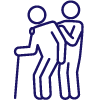- 横浜市トップページ
- 中区トップページ
- いろいろな言葉(Multilingual)
- English
- Public Relations Magazines
- Koho Yokohama Naka Ward Version(~2023)
- 2022
- June ①Take care to avoid wasp (or hornet) stings and mosquito bites! ②Preventing heatstroke ③FY2022 Naka Ward Administration Policies
ここから本文です。
June ①Take care to avoid wasp (or hornet) stings and mosquito bites! ②Preventing heatstroke ③FY2022 Naka Ward Administration Policies
This is an abridged version of “Koho Yokohama Naka-ku Ban,” Naka Ward Office’s public relations magazine. (Click here for the multilingual website of “Koho Yokohama City Edition”) Please note that all information is correct as of the time of publication and may be subject to change.
Last updated date:2024/10/4
① Take care to avoid wasp/hornet stings and mosquito bites!
Inquiries: Kankyō Eisei-gakari(Environmental Sanitation Section),
Naka Ward Office Tel: 045-224-8339 Fax: 045-681-9323

Naka Ward Office receives numerous consultations about wasps/hornets and mosquitoes every year. This month, we discuss steps you should take to be ready for the summer season.

Wasps and hornets
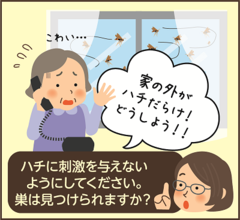
There is a swarm of wasps (hornets) outside my house! What should I do!?
⇒ Please do not irritate the wasps (hornets). Can you find the nest?

- Wasps and hornets tend to build their nests in the following kinds of places
Under eaves
Inside ceilings
In door pocket fixtures
In walls
Under floors
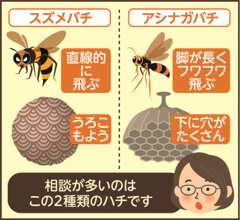
- Characteristics of wasp/hornet types and nests
Hornet (suzumebachi)
Fly in a straight line
Nest: Scaly
Paper wasp (ashinagabachi)
Long legs and float around in the air
Nest: Many holes underneath
⇒ These two types of wasp/hornet account for the majority of consultations.
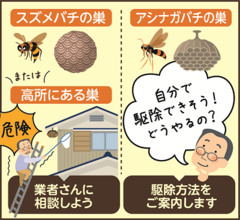
- If you want to get rid of a wasp/hornet nest..
Hornet nests, or nests in high places
⇒ Consult a professional!
Paper wasp nest
⇒ We will explain how to get rid of it!
Why is it necessary to take measures against wasps and hornets?
When a nest forms near a house or other location, you may be stung by wasps or hornets that attack to protect the nest. Find nests early while they are still small and take measures to deal with them!
● Inspect the perimeter of your home
Wasps and hornets begin to build their nests in the spring. The nests grow in size from summer to fall, and the number of wasps/hornets increases, making them more dangerous. To detect nests before they grow too large, inspect areas where nests are likely to form as soon as possible.
● If you find a nest...
- You can get rid of the nests of paper wasp nests by yourself. Please consult with the Kankyō Eisei-gakari (Environmental Sanitation Section), which provides instructions on extermination methods and lends protective clothing.
*Naka Ward Office does not provide extermination services.
- If you cannot exterminate a wasp nest by yourself, the Kankyō Eisei-gakari (Environmental Sanitation Section) will refer you to a professional exterminator (for a fee).
*If you find a hornet nest, we recommend that you ask an exterminator to remove it.
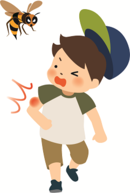
● If you get stung by a wasp or hornet...
- Rinse the wound with water and cool it.
- Squeeze out the venom with your hands (do not suck it out with your mouth!).
- Apply insect bite medicine (topical antihistamine) to the affected area.
If you feel unwell after being stung by a wasp or hornet, see a doctor right away!
Wasp and hornet stings can cause anaphylaxis (sudden allergic symptoms) in some people.
If you feel sick, have difficulty breathing, or experience any other symptoms, seek medical attention immediately.

Mosquitoes
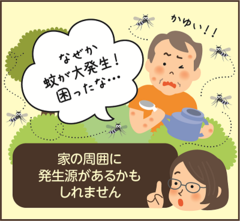
Oh no... For some reason, mosquitoes are out in full force!
⇒ The source of the outbreak may be in the vicinity of your home!
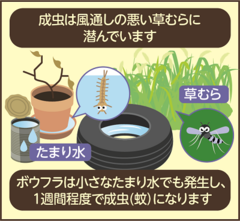
- Here are some of the most likely sources
Stagnant water
Grassy areas
⇒ Adult mosquitoes hide in poorly ventilated grassy areas.
Mosquito larvae are found even in small pools of water and become adults (mosquitoes) in about one week.
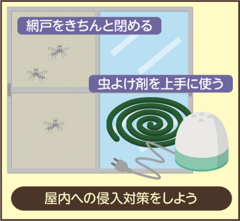
- Measures you can take to avoid mosquito bites in your home
Close screen doors properly
Use insect repellents effectively
⇒ Take measures to prevent insects from entering your home.
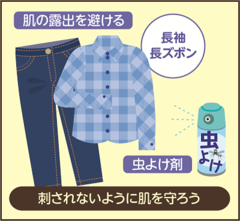
- In places where mosquitoes are likely to be present
Avoid skin exposure (wear clothing with long sleeves, long pants)
Use insect repellent
⇒ Protect your skin from bites.
Why is it necessary to take precautions against mosquitoes?
Mosquitoes carry a variety of infectious diseases, including dengue fever and Zika virus infection. Bites from mosquitoes that have sucked the blood of an infected person can lead to these infections. Take measures both to prevent the proliferation of mosquitoes and to avoid mosquito bites.

● Prevent mosquitoes from multiplying
- Eliminate stagnant water around your house, which is a source of mosquito larvae.
- Mow the grass regularly to eliminate grassy areas where adult mosquitoes hide.
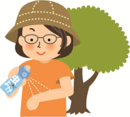
● Avoid mosquito bites
- Avoid exposing your skin to mosquitoes in areas where mosquitoes are likely to be present.
- Use insect repellents effectively. Follow the directions for use and dosage in the instruction manual.
② Preventing heatstroke
Inquiries: Keibō-ka Kyūkyū Tantō (Emergency Aid Subdivision, Fire Suppression Division),
Naka Fire Station Tel/fax: 045-251-0119
Let’s prevent heatstroke and get through the summer in good health.
What are the days when heatstroke increases?
Days when the heat index (WBGT) is high
⇒ Information on heatstroke prevention, website of the Ministry of the Environment of Japan(外部サイト)
How can we prevent heatstroke?

- Prepare your body for the heat
Exercise moderately from the beginning of the hot season to get your body accustomed to the heat.

- Avoid the heat
Avoid going outside when the heat index is high. If you must go outside, try to stay in cooler places when walking around, such as in the shade.
Heatstroke can also occur indoors. Use air conditioners and fans to regulate room temperature.

- Stay hydrated and replenish salt
Drink water before you get thirsty, and if you sweat a lot, drink a sports drink or oral rehydration solution to replenish salt.

- Remove your mask as needed
Avoid exercising while wearing a mask, and remove your mask when appropriate when outdoors and at a sufficient distance (2 m or more) from others.
③ FY2022 Naka Ward Administration Policies
Inquiries: Kikaku Chōsei-gakari (Planning and Adjustment Section),
Naka Ward Office Tel: 045-224-8127 Fax: 045-224-8214
The Naka Ward Administration Policies indicate how Naka Ward Office will promote the administration of the ward.
This is a summary of the Naka Ward Administration Policies for the fiscal year 2022.
Basic goal
Naka Ward, a safe and vibrant community for all – A great place to live, work or visit –
Five measures to achieve our goal
1. Creating a safe, secure, and healthy community for people to live in
We are working to promote urban development of a kind that enables us to properly respond to emergencies. This means not only safeguarding the daily lives of residents, but also includes consideration for non-residents who work in or come to visit Naka Ward.
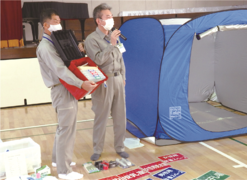
2. Creating a community in which people of all ages support each other
We will promote the development of a community in which everyone supports and helps each other, allowing anyone to continue to live in peace in the neighborhoods they’re familiar with as they see fit.

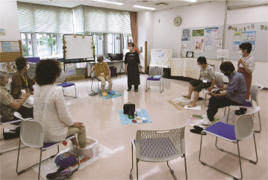
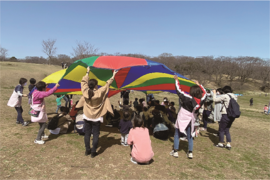
3. Creating a multicultural community
We will encourage the development of a diverse community where people of all nationalities and backgrounds can live happily together in harmony and mutual respect.

4. Creating a community brimming with local vitality
We will promote the development of a vibrant and energetic community where individuals and the wider community can take initiatives for themselves.
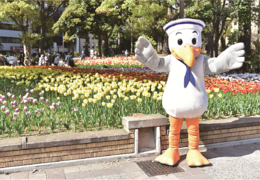
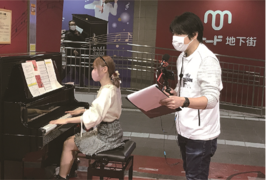
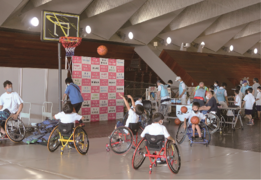
5. Creating a ward office that works hand-in-hand with the local community
We will work to create a ward office that is sympathetic and trustworthy by providing administrative services that meet the needs of ward residents.
ページID:208-879-384








